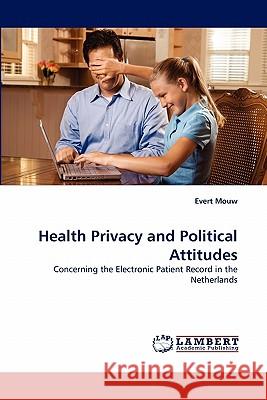Health Privacy and Political Attitudes » książka
Health Privacy and Political Attitudes
ISBN-13: 9783843361545 / Angielski / Miękka / 2010 / 72 str.
The electronic patient record (EPR), although very useful, could have negative consequences for one's personal privacy. This book gives an introduction to health privacy issues. It also explores the relation between political attitudes and health privacy. {{ ABSTRACT: The storage of personal health information in nationwide EPR has led to a heated political debate in the Netherlands. The link between the political attitudes of individuals and the value given to health privacy is largely unknown. This study introduces the Health Privacy and Political Attitudes Survey. Results: most political attitudes are not a good predictor of ideas on health privacy, but authoritarian attitudes strengthen the trust in (government regulated) electronic records. Weak evidence suggests that women are more enthusiastic about the EPR. Earlier research from the Rathenau Institute (2009) indicated that higher educated persons are less enthusiastic about the EPR; this study weakens their finding. }}
The electronic patient record (EPR), although very useful, could have negative consequences for ones personal privacy. This book gives an introduction to health privacy issues. It also explores the relation between political attitudes and health privacy. {{ ABSTRACT: The storage of personal health information in nationwide EPR has led to a heated political debate in the Netherlands. The link between the political attitudes of individuals and the value given to health privacy is largely unknown. This study introduces the Health Privacy and Political Attitudes Survey. Results: most political attitudes are not a good predictor of ideas on health privacy, but authoritarian attitudes strengthen the trust in (government regulated) electronic records. Weak evidence suggests that women are more enthusiastic about the EPR. Earlier research from the Rathenau Institute (2009) indicated that higher educated persons are less enthusiastic about the EPR; this study weakens their finding. }}











